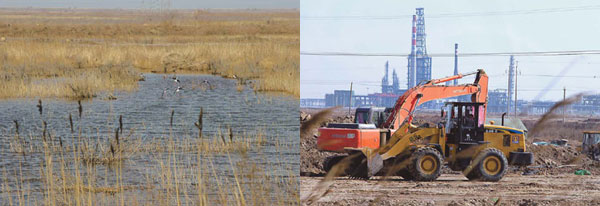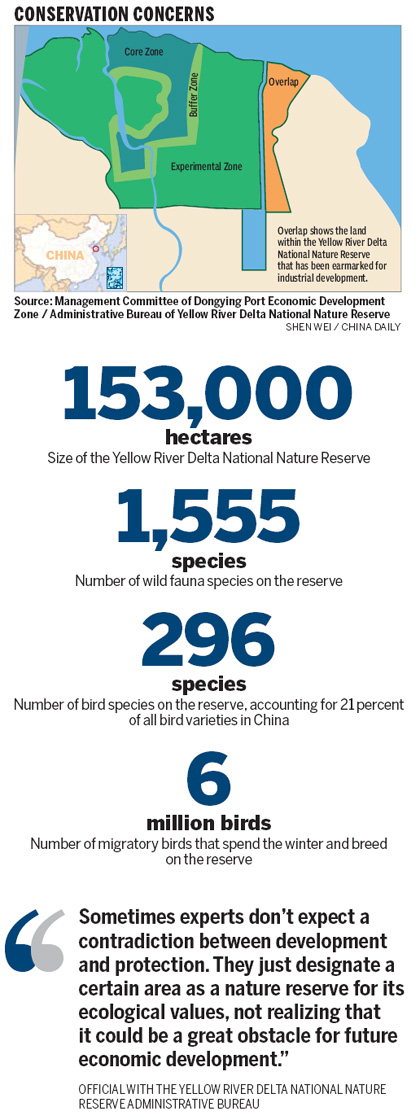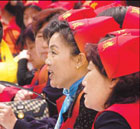Society
Polluting firms pose big threat to wetlands
By Li Jing (China Daily)
Updated: 2010-05-19 08:06
 |
Large Medium Small |
|
 A flock of one of many species of birds gather in a pool at the Yellow River Delta National Nature Reserve in Dongying, Shandong province. In other parts of the reserve, bulldozers are busy leveling the land for the construction of an economic zone. [Feng Yongbin / For China Daily] |
Yet a large slice of this reserve in Shandong province is being destroyed to make way for industrial development projects sanctioned by the local government - a move that flies in the face of the country's strict laws on conservation.
The vast wetlands, which were formed over centuries by silt from the Yellow River, are about 30 km north of Xianhe, a small town on the east coast.
Today, only a road separates the eastern border of nature reserve and a petrochemical base currently under construction.
On one side of the road, bulldozers are busy leveling the land, while construction workers bury pipes underground as part of the industrial project. On the other is what used to be the wetlands, now drained and dredged, with the soil piled up into ridges. Heavy-duty trucks arrive every day to take the soil away.
Only several pockets of wetlands are still visible, with reed marshes dotted with small ponds and a flock of black-winged stilts cruising in the water pools.
When it comes to natural ecological systems, wetlands are commonly referred to as "Earth's kidneys" as they play a crucial role in water conservation, as well as the prevention of erosion and flooding.
Residents and ecologists argue that the ongoing development is not only a threat to the reserve's abundant vegetation and aquatic organisms, but also could disrupt a vital migratory point for waterfowls and other birds from Northeast Asia and the Western Pacific.
More than six million migratory birds spend the winter and breed in the area, according to the reserve's administrative bureau.
"The birds are very sensitive to any changes in their habitats, so to preserve the original landscape is the best way to protect the Yellow River Delta," said 40-something bird lover and amateur photographer Sun Jinsong, who has spent years taking pictures in the conservation zone.
In the middle of the construction site, a petrochemical plant called Haike Ruilin is already in operation, with flames reaching into the sky from its flare stack.

The factory opened the first phase in March to make products including gasoline, diesel, liquid gas and refinery coke, and was expected to bring an annual sales income of 5.8 billion yuan ($850 million), according to a city newspaper in nearby Dongying.
The work now under way on the industrial site will see it expanded to 100 hectares, with 11 new projects including petrochemical, chlorinate alkali and oil refining plants. All are expected to start operations by 2013, while the budget is estimated at 4.3 billion yuan.
Five chemical plants have already been built, five are under construction and two more are still in the planning stages, according to a Xianhe-based engineer named Lu who cited information from the Dongying Mayor Hotline.
The petrochemical base is part of Dongying port economic development zone, approved by the Shandong provincial government in 2006, which will eventually cover an area of 232 square kilometers, focusing on petrochemical, marine chemical, salt chemical and coal chemical industries.
The coastal site boasts many important competitive edges, according to the website of Dongying's management committee for the development zone, which cited that fact it is close to a large port, as well as Shengli Oil Field, the second largest in China, which has 4.8 billion tons of proved oil reserve (annual production of crude oil is about 27 million tons) and 230 billion cubic meters of proved natural gas reserve.
The vast State-owned "waste alkali land" is another advantage for the development zone as no arable land is involved, the website reads, before adding: "The abundant land resources will provide solid guarantee for industrial development, especially when other coastal areas are currently running short of land."
However, the website fails to mention anything about the Yellow River Delta Nature Reserve, even though a featured planning map suggests the development zone actually overlaps the conservation area.
Against the rules?
The natural reserve is managed by three stations: Dawenliu, Huanghekou and Yiqianer. The first two are responsible for the Yellow River estuary and its surrounding area, while the area next to the petrochemical base comes under the Yiqianer.
An official heading up scientific research for the reserve's administrative bureau, who did not want to be identified, admitted the industrial development plans do encroach onto its "experimental area".
"There is an overlap," he told China Daily after drawing a line on a map to prove it. "We are against the plan and have been trying to stop it, but to no avail. We have to acquiesce (to such development projects)."
He explained there is no plan yet to change the boundaries of the nature reserve to allow more space for the development zone.
The country's Regulations on Nature Reserves define three "function areas" of any reserve. It also stipulates that the "core area" and function area should be strictly protected, and only opened for scientific observation and research.
The experimental zone can be used for scientific experiments, educational activities and tourism.
"Activities such as logging, grazing, hunting moor burning, mining, quarrying and dredging are forbidden," according to the rules.
Changing the boundaries or functions of a nature reserve have to be approved by the State Council, said Zhu Guangqing, deputy director of the Ministry of Environmental Protection's natural protection and ecology conservation department.
"The principle is that, once the boundaries and functions of a nature reserve are settled, changing them should be avoided," he said.
This suggests that the activities in the experiment zone of the Yellow River Delta Nature Reserve - draining and dredging - are illegal. The planning of the development zone is also against the law.
However, conflicts between nature conservation and economic development are "not uncommon" in China, and some provinces are currently trying to adjust the boundaries of nature reserves, said the administrative bureau official in Dongying.
"Sometimes experts don't expect a contradiction between development and protection. They just designate a certain area as a nature reserve for its ecological values, not realizing that it could be a great obstacle for future economic development," he said.
What is special about the Yiqianer site is that the administrative bureau only has partial land ownership of the nature reserve, making it even more difficult to effectively manage the site, he said.
Surrounding communities can continue with their traditional and agricultural activities, such as fishing, apiculture, wood collection and oil extraction, under an agreement with the administrative bureau, Chen Kelin, China director of Wetlands International, wrote in a paper about the Yellow River Delta published by Ramsar Convention, a UN wetlands protection body.
"In most cases when there is a sharp conflict, the government will decide the outcome," wrote Chen.
Asked whether the petrochemical plants would have a negative impact on the birds living and breeding on the nature reserve, the Dongying official replied: "As long as wastewater (from the plants) is not directly discharged into the reserve and damages the water systems, the impact will be limited."
However, there are still no monitoring facilities for pollution on the reserve, he added.
Wing and a prayer
Environmental experts fear the increase in chemical plants could do irreversible harm to the birds and their habitat.
"Nature reserves have boundaries but we cannot limit the birds' flight route," said Zhang Zhengwang, a professor of ecology at Beijing Normal University, who is concerned that the fumes, odors and potential pollution may impact the migration process.
Residents have already complained about the odor from Haike Ruilin. On March 25, gas emitted from the petrochemical plant was blamed for sickening two workers at Shengli Oil Field.
"Many people living in the town have reported (the odor) to the environmental authorities," said Xianhe engineer Lu. "The factory did not discharge the waste gases for about two weeks in mid-April. After they started again, the smell came back."
While Huanghekou and Dawenliu stations receive more tourists and public exposure about the wetland protection, residents and bird lovers near Yiqianer say the booming economic development could seriously damage this untapped natural ecology.
Ding Hong'an, a photographer in his 50s, once spent seven months and used 750 rolls of film to capture just one shot of a very rare bird on the reserve, which is home to 21 percent of all species native to China.
"I looked at my pictures before the last Spring Festival and discovered that I have already recorded 282 different varieties of birds in the past years," he said excitedly.
Energetic and talkative, Ding is popular among local bird watchers for his collection of work over the past 10 years, which includes the female bird feeding her fledglings and birds swooping to catch fish.
"I haven't done all this for myself. I just want to leave some historical record for future generations, because these birds may disappear sometime," he said.
That could be sooner than Ding thinks, according to his friend Sun Jinsong, who believes it has become far more difficult to get photographs of rare birds in recent years.
"In the 1990s, you can easily spot white swans, even near the highways. Nowadays, you need to go deep into the reserve (to find them)."







